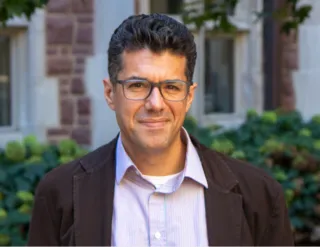
Chair's Corner
By Jeff Zacks

Dear Friends,
I am excited to connect members of the Washington University Psychological & Brain Sciences community with the relaunch of this newsletter. Some of you may remember that the Department used to produce a paper newsletter that was a trove of information, connecting alumni, current students, faculty, staff, and friends of the department. That publication went through a couple transformations, with considerable change in the shift to electronic distribution. With this reboot we are bringing back some features of the older newsletter format that were lost along the way and adding new ones.
For those who have been out of touch for a while, let me reconnect you with the department. We consist of 38 faculty, of whom 2 are research track faculty, 4 are teaching track faculty, and the remainder are tenure track faculty; 19 postdocs; 67 PhD students; and 58 staff. Psychological & Brain Sciences remains a very popular area of study on the Washington University campus: We currently have 495 majors (the second most popular major in Arts & Sciences) and 275 minors. We also are a central partner for the Philosophy-Neuroscience-Psychology program. Our majors are divided between the primary Psychological & Brain Sciences major and the Cognitive Neuroscience major, which had its first graduate in 2017. We are organized into four interest areas: Aging & Development, Behavior/Brain/Cognition, Clinical Science, and Social/Personality; however, these interest areas are by no means siloed and many faculty, postdocs, and graduate students identify with more than one area. The Clinical Science program maintains the Psychological Services Center, which provides affordable care to area residents while providing supervised clinical training to Clinical Science graduate students.
We are, as ever, a highly research-intensive enterprise. The articles in this issue delve into detail about some of the exciting current research initiatives and some of the honors that have recognized these activities. We are also dedicated to excellent classroom teaching and to one-on-one mentoring, which is attested by the teaching and mentoring awards listed in Awards.
In the last few years, we have undertaken a number of exciting new initiatives. Let me highlight just a few. The Robert L. Williams lecture honors the accomplishments of our late colleague, who served as a long-time faculty member in this department and also as the founding director of the Black Studies program, which eventually became the Department of African and African-American Studies. The first Williams Lecturer, who spoke last fall, was Robert Sellers of the University of Michigan. This fall we will inaugurate the Mark S. Gold Lecture in Translational Neuroscience, thanks to a gift from undergraduate alumnus Dr. Mark S. Gold, MD. Over a distinguished career at the Yale School of Medicine and as a department chair at the University of Florida, Dr. Gold has pioneered advances in the science and medicine of addiction and of obesity. The first Mark S. Gold lecturer will be Sir Robin Murray of Kings College London, who will visit this September to lecture and to meet with students, postdocs, and faculty. Finally, we are building infrastructure to increase support for graduate and postdoctoral research. Thanks to a gift from the family of Elise Herzog, we have established the Elise Herzog Mental Health Research Fund, which provides support for trainees to pursue independent research related to mental health. The first two awards were made in 2023, and in 2024 we made one award.
I could go on and on but let me stop here so that you can get on to the rest of the stories in this newsletter. I hope you enjoy them! And I hope that you will reach out to me with any feedback (positive or otherwise!), news to share, or anything else Psychological & Brain Sciences.
Jeff
Jeffrey M. Zacks, PhD
Edgar James Swift Professor of Psychological & Brain Sciences
Chair of Psychological & Brain Sciences
Professor of Radiology
Director, Dynamic Cognition Laboratory